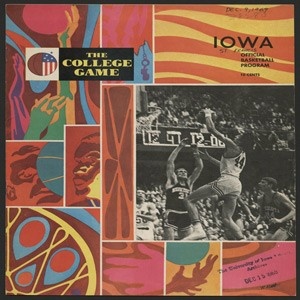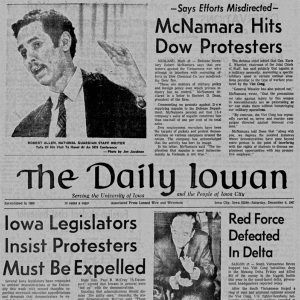Editor’s note: The Old Gold series provides a look at University of Iowa history and tradition through materials housed in University Archives, Department of Special Collections, University of Iowa Libraries.
It’s groovy! Far out! Be there or be square! You dig?
If the above expressions make sense to you—or even if they don’t—Old Gold invites you to an online experience that captures a remarkable era: Uptight and Laid-Back: Iowa City in the 1960s. The virtual exhibit was launched recently by the UI Libraries and features thousands of images from dozens of collections in University Archives. The project is a collaboration among the archives, the Digital Scholarship and Publishing Studio, and the UI Libraries’ preservation and conservation staff.

The site offers glimpses into student life at the State University of Iowa (as we were known prior to 1965) during that tumultuous decade: the burgeoning civil rights movement, military service, antiwar activism, popular culture, and more. Although the title refers to the 1960s, its timeline bookends are Martin Luther King Jr.’s 1959 appearance at the Iowa Memorial Union and what was dubbed the “last antiwar march” on the Pentacrest following the signing of the Vietnam peace accords in Paris in 1973. In between are newspaper clippings, FBI files, photos, film and audio clips, and other content selected from the archives.
From the site’s home page are links to some basic resources to help you get started in your journey, including access to all back issues of The Daily Iowan and the Hawkeye yearbook. There is an interactive map of the campus that highlights selected events year by year. Audio highlights include a complete recording of Dr. King’s Nov. 11, 1959, speech before a standing room–only crowd in the Iowa Memorial Union Main Lounge. Film footage includes a half-hour documentary, On a Confrontation in Iowa City, chronicling events of an antiwar demonstration on Dec. 5, 1967.

Other highlights include an LP record—remember those?—called Echoes of Old Gold. The phonograph record was digitally reformatted for the exhibit and features nearly 100 sound bites collected around the campus during the 1964–65 school year by student Frank Patton. The recordings include brief clips of the Hawkeye Marching Band, the Scottish Highlanders, Iowa football, a phone-in order for pizza, and KAAY radio originating from Little Rock, Arkansas—a favored source of rock-and-roll music at the time. More content, including highlights of selected oral history interviews, will be added to the exhibit in the months to come.
Curating the exhibit prompted Old Gold to think of his own college experience in the decade following events chronicled here. Much of what Old Gold took for granted in college—liberalized dorm rules, for example, and the proliferation of housing options and co-ops—can be traced to a time not long before.
Ready to tune in? Keep away from a bad scene, cats and chicks! Go to dsps.lib.uiowa.edu/sixties and do your own thing.